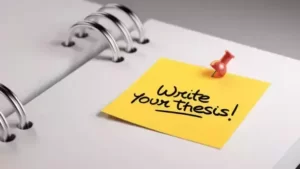Know More About Academic Writing
There are different types of academic writing, each with its own purpose and style. Expository writing is used to inform or explain, Argumentative writing is used to persuade, and Narrative writing is used to tell a story.
Crucial Aspects of Academic Writing You Must
Write With a Purpose
One of the most important aspects of academic writing is purposeful writing. This means that every text element should contribute to the overall message or argument the author is trying to communicate.
To accomplish this, academic writers must be clear about what they want to say before they start writing. Once they understand their purpose well, they can begin planning and organising their thoughts into a coherent argument.
Think Analytically
Another key element of academic writing is analytical thinking. Academic assignment writers must be able to critically analyse their sources and draw conclusions based on their findings. This requires them to think deeply about the issues at hand and develop well-reasoned arguments supported by evidence. You must be familiar with their different research methods to do this effectively.
Educate the Readers
In academic writing, the informative pattern of writing must be followed. It seeks to educate its readers on a particular subject matter. Its goal is not only to provide information but also to explain any complexities involved for readers to understand better the topic being discussed. For informative academic writing to be successful, it must be highly researched.
Maintain the Objectivity
Biasness has no point in academic writing. If a writer cannot maintain the objectivity of the ideas, then the purpose of academic writing is already lost. Making logical inferences and opinions based on facts is the foundation of every type of academic writing.
Things You Need to Know Before Starting Academic Writing
There are things which can help you to excel in the art of academic writing. When you take notice of these aspects, it will help you to start with confidence and make a perfect write-up. So, let’s consider these things before we actually start.
Nobody Writes the Perfect First Draft
We think writing is all about putting together words to make a sentence and keep doing that. But it’s not that simple. Even brilliant writers make the first draft terrible. But of course, it is the first brick towards success, so it has all the essentials of making it perfect.
Keep Track of Sources
Step by Step Guide
Here comes the ultimate guide, which will help you make the perfect assignment.
Pre-Writing Phase: Take the Writing to The Next Level by Reading
Before writing, brainstorming is the best thing to do. You can get information from the internet and read recent research about the topic. It will give you an idea of how things are moving around. When you reach the level of connecting the dots of different information. You are all set to start your imperfect first draft.
Develop Working Title
It is good to make a working title of your interest. It will keep you engaged instead of making it according to the assignment. Try to make it according to your understanding which can direct you towards the goal. This way, you can also avoid thinking about each session’s title and headings.
Write Without Hesitation
It is the ideal rule to write without any resistance. When you write in a carefree manner, it will help you to generate your ideas and reflection on the topic. You can work on refinement later, but for the pre-writing phase, you don’t have to worry about it. Simply write what’s in your mind.
Draw a Mind-Map
When you have so much on your mind, it is good to arrange it into the mind map so you can fit in the information where it belongs. It will help to develop a framework. The more you invest in mind mapping, the more it will make it easier to maintain the flow of writing.
Start From the Scratch
Make The Draft
Making the first draft always comes with anxiety. No matter how sure you are about what you are going to do. The initial phase always got everyone into the depth of uncertainty. At this point, you can use your working title and unhesitant-writings to make a start. Write with a bit more clarity and look for the guidelines you must follow for the task.
In the first draft, the thesis statement is the most crucial thing you need to be sure about. Make the perfect thesis statement. Use all the information you’ve gathered by now and make a compelling thesis statement because this is where your assignments will weigh the most. Refine it at this very point if you need to but make it the perfect part of your first draft.
Revise, Edit, Revise and Edit-Repeat the Cycle to The Point of Perfection
When you’ve completed your first draft, it might be in a condition you don’t want to look at. But the only way to make it perfect is to work on it tirelessly. Look for the pointers you need to follow. Look for the arguments you’ve made. Make grammar perfect, and try to exclude wordiness in your sentences.
The Final Review
In the final stage, you are near perfection. Here you’ve to ensure that your assignment has everything included and arranged.
Countercheck the Guidelines
Make sure to meet the guidelines of the assignment. If you are instructed to add something mandatory or if there is any pattern to follow. Meet the learning outcomes and ensure that your thesis statement fits with the purpose of your writing.
Compliance With the Formatting Rules
Academic writing follows specific patterns and rules. Especially in a dissertation, you have to abide by the formatting. There are different referencing formats, so ensure that your workpiece complies with all the formatting details.
Proofread and Finalise
When you are done with the above mention step, proofread your content for the last time and look for any errors. When you are sure that your writing has reached the point of perfection and has no errors, you are ready to go further!
Check Plagiarism
Plagiarism comes under unethical practice. When you finalise the draft, check the authenticity of the content. It is important to make the assignment unique. Refer to every idea if you’ve taken it from somewhere. This way, you can ensure that your assignment is perfect to ace.
Make It Presentable
Once you have ensured all these aspects, you can be sure that your work is good to go. By reading all these steps, you might be thinking that academic writing is quite a time-consuming task. But we have an easy way out for you if you are on a time strain.
An Easy Way Out to Escape the Hurdles of Academic Writing
What you can do is look for the best assignment help to assist you in every type of academic writing. We also offer the services of our expert academic writers. They are skilled in following the academic writing guide. Plus, you don’t have to worry about the pricing because it’s highly reasonable for students.
Ending Note
Academic writing has many features that distinguish it from other genres. Some of these features include the use of formal language, the focus on objectivity, and the use of evidence to support claims. But we understand that if you do not want to go on this extensive journey of academic writing, simply contact us for any task, and we will save you from the hurdles.





